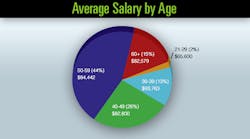"The cost of doing business continues to increase year after year, but internal resources continue to diminish. Makes it very difficult to run a successful operation." – senior executive/VP for a retailer with 26-30 years of experience, living in the Middle Atlantic region and earning $121,000
"Last year our company recovered very well from the recession. This year we have started off very slow. We've cut work hours by 20% temporarily, waiting/hoping business will pick up soon." - Transportation manager for an industrial machinery manufacturer with 26-30 years of experience, living in the Pacific region and earning $55,000
"Salaries need to match the importance of these functions. People in this field are occasionally taken for granted and not properly compensated." – senior executive/VP with a chemicals manufacturer with 11-15 years of experience, living in the South Central region and earning $184,000
"I'm quite happy with all aspects of my job. I've tried other career paths, but have always come back to this arena." – senior executive/VP for a toy manufacturer with 30+ years of experience, living in the Pacific region and earning $150,000
A refreshing and welcome change has taken place in the material handling and logistics industry over the past year: Raises are actually back in vogue. The average salary for all respondents to the MH&L 2013 Salary Survey rose by 3% over the previous year, to $84,337. Given that the U.S. inflation rate in 2012 was 2.1% (according to the U.S. Bureau of Labor Statistics), this also represents the first time in several years that salaries for material handling and logistics professionals outpaced the rate of inflation.
See Also: MH&L 2013 Salary Survey Slideshow
For the second year in a row, more than half (53%) of all respondents said they received a raise last year. What's more, 58% expect a raise in 2013. And yet, maybe the recession and the agonizingly slow recovery have left many of these managers feeling that the bump in their salaries in 2012 was a case of too little, too late. When asked how satisfied they are with their current jobs, 65% said they were satisfied or very satisfied; that number was 66% a year ago, and 69% in 2011. The number saying they're satisfied or very satisfied with material handling and logistics as a career path was also down, from 72% in 2012 to 70% this year. So these downward trends are a bit disconcerting, to say the least.
At any rate, based on our research, we can paint a portrait of what the "typical" material handling and logistics executive looks like. If such a person actually existed, he would be a white male in his 50s, living in the Midwest, with more than 30 years of experience in the industry, and working for a manufacturer of industrial machinery. This typical person is in a corporate/executive management role, has a four-year degree, has been with his current company for 6-10 years, and did not earn an annual bonus last year.
Knowing what's "typical," however, only tells a very small part of the story. Throughout this article, the accompanying charts and the anonymous comments of your peers will bring to life exactly what different types of challenges material handling and logistics professionals face today, as they confront the daily realities of managing the supply chains that make this country work.
The Nature of the Job
"Our customer base has changed and in the automotive world it is tough to get ahead of what they will do." – corporate executive in the automotive industry with 30+ years of experience, living in the North Central region and earning $55,000
"The oil & gas industry is the best industry in the world. It spends the most money, pays the most money, is the cleanest (pay no attention to environmentalists who make up things to increase their cash flow), and is the backbone of ALL economies in ALL countries in the world, bar none." – corporate executive for a 3PL serving the oil & gas industry with 30+ years of experience, living in Canada and earning $150,000
"Working for a retailer has been difficult for the last several years. I am proud to say, we work very hard to contribute effectively to the bottom line. Our company recognizes this and makes it known that it could not be successful without us." – senior/executive VP for a retailer with 26-30 years of experience, living in the Middle Atlantic region and earning $121,000
"I've been doing contract work for the past 4-5 years due to the lack of jobs and high availability of expertise in the Silicon Valley. I would prefer a permanent job but there are very few and companies want MBAs or more. These types of positions are not reflected in the unemployment stats, which to me is quite deceiving. Many people are working contract/1099 positions to have some kind of income." – logistics manager with an electrical equipment manufacturer with 26-30 years of experience, living in the Pacific region and earning $80,000
Material handling and logistics professionals work in just about every industry you can name, for manufacturers, retailers and service providers of every size and type. According to the survey, the largest number of them work for manufacturers of industrial machinery (9%), but right under that group are several other industry groups, each of which account for 8% of the responses: makers of material handling equipment; metals and metal products manufacturers; and transportation/warehousing companies.
As you might expect, since jobs in those industries tend to be the most prevalent, the salaries are among the lowest across the board. The best-paying jobs for material handling and logistics managers are in aerospace & defense ($137,133), automotive/transportation vehicles & equipment ($130,825), and chemicals ($111,315). The lowest salaries are in the paper/printing/publishing field ($61,500) and in the food & beverage industry ($61,631).
When it comes to job titles, the top salary is not earned, as you might expect, by corporate/executive managers (CEOs, COOs, presidents, etc.), who are paid an average of $116,367, but in fact senior/executive vice presidents, who earn $122,608. Two possible reasons for this trend are: 1) the financial package for C-suite managers typically also includes hefty bonuses, which are not included as salary; and 2) in some cases, particularly in smaller companies, the CEO is also the owner of the company, who might opt to take a relatively modest salary for a period of time for various reasons.
The Age of Reason
"I'm pretty much at the end of my career. I guess I had always thought that it would be much different at the end. The harder you work it just seems that the recognition is not there!" – facilities manager for a construction/building equipment company with less than 2 years of experience in material handling and logistics, over 60 years old, living in the North Central region and earning $85,000
"I am 66 years old and semi retired, so I am grateful to have something to do. I am a consultant, and finding jobs to work on is still the hardest part of my job." – corporate/executive manager for a consulting firm with more than 30 years of experience, living in the North Central region and earning $83,200
"In my field your age can have a lot to do with your job. I service overhead cranes and automated machinery and I have people that work under me and if they can't figure it out or I can't talk them through it I have to do it hands on and that's where my age may come into play because there is a lot of climbing involved in my field." – service manager for a material handling equipment manufacturer with 21-25 years of experience, between 40-49 years old, living in the South Central and earning $50,000
People who work in managerial roles in the material handling and logistics industry tend to stick around for a long time… a very long time. More than one-fourth of all respondents (26%) have spent more than 30 years in the industry, and 59% of all respondents are at least 50 years old. That doesn't necessarily mean that experience translates into higher salaries.
The "sweet spot" for top salaries, according to the survey, appears to be somewhere between 3-10 years of experience, for managers who are in their mid- to late 30s. Respondents who are in their 60s or older actually make less than any other group except for those in their 20s. Also, fully half (50%) of all respondents said their last job promotion was more than five years ago, indicating that either they'd risen as high as they were likely to go in their companies, or that they were stuck with few or limited career advancement opportunities.
The most important consideration for all respondents is not base salary (21% of responses), though, but rather job stability (25%). No other answer came even close to those; the third-most frequent response was "recognition of your importance to the company" (12%).
Whatever it is that managers are looking for from their jobs, it's clear that not every company is taking the time to satisfy the many and varied needs of its key supply chain employees. "More and more people are leaving their current employers," points out Jason Breault, managing director of LifeWork Search, a workforce management company specializing in supply chain planning, logistics and transportation. "The job market is picking up and many employees are taking advantage of it." Breault believes that as many as 80% of employees could be looking outside of their companies for a new position.
"For a company's most crucial positions you have to hire someone who already has the education, skills and experience on day one, and if there isn't an internal promotion possible, they will have to hire from the open market. That open market isn't as strong as many might think," says Breault. "Many organizations will lose their top players, and although the talent pool is large, it remains weak."
Whether or not Breault's prediction comes true, there's no doubt that the old adage is as true today as it's ever been: the best manufacturing and retail companies in the world employ the best supply chain people. That's not a coincidence. In the current slow-as-molasses economy, the fact that material handling and logistics people have seen their salaries increase faster than the rate of inflation is a good sign that their companies are beginning to recognize the importance of a well-managed supply chain.
Click here to download your very own copy of MH&L's 2013 Salary Survey.






